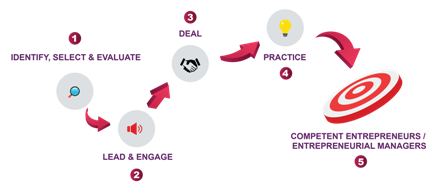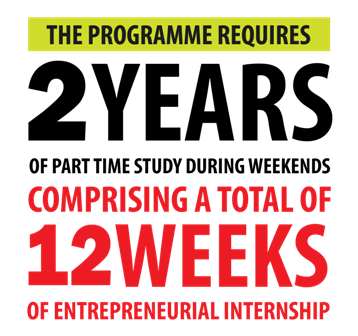The Programme

In today’s era of globalization with rapid and continuous change in work environment, competitive and sustainable advantage will increasingly depend on our capacity for innovation; the creation and development of something new through knowledge, skills, and creativity of individuals. This opportunity-focused approach requires a creative state of mind that can react to unexpected problems and opportunities. It is therefore important to promote entrepreneurship education as a stimulus to enterprising behaviour among not only those aspiring to start and run business enterprises, but also those wishing to develop the necessary survival skills in today’s fast changing world. This programme will be implemented by MASMED, UiTM in cooperation with Faculty of Business Management, UiTM. Upon completion of the programme, the graduates will lead start-up companies in order to commercialise technologies that have been successfully presented (through business plans) and approved by the Panel of Assessors.
Aim of the Programme

The Master of Applied Entrepreneurship programme aims to produce entrepreneurs/entrepreneurial managers who are competent, efficient, effective and responsive to entrepreneurial opportunities especially in the face of challenges of globalization and changing work environment. The overall aim of this programme is to produce competent entrepreneurs / entrepreneurial managers who have the ability to:
- identify, select and evaluate feasible and viable entrepreneurial opportunities;
- make sound judgment in steering the organization forward using latest managerial tools;
- lead and engage in new and competitive ventures and to ensure sustainability;
- deal with complex business and entrepreneurial issues facing new and emerging ventures;
- practice ethical and professional values in managing their ventures locally and globally.
Programme Duration
|
|
The Master of Applied Entrepreneurship requires 24 months of part-time study during weekends comprising a total of 12 weeks of entrepreneurial internship. |
Programme Structure

The program has been designed to help students to generate ideas and develop them into business plans, using real-life examples to inspire them. The curriculum is explicitly built around six integrated core courses (24 credits):
- Entrepreneurial Opportunity Analysis & Business Planning
- Entrepreneurial Marketing
- Managing Innovation & Technology Entrepreneurship
- Operations Management
- Entrepreneurial Financial Management
- Entrepreneurial Strategic Management
-----And-----
Two of the three program electives (8 credits):
- Social Entrepreneurship
- Business Application System
- International Entrepreneurship
-----Plus-----
A compulsory activity (12 credits):
- Project: Entrepreneurial Internship.
Entrepreneurial Internship
Over a period of twelve weeks during the final semester, each student will undertake a real-life business incubation project to assess the feasibility of, finalise a new venture plan for, develop the infrastructure for, prepare a funding proposal for and/or launch a new venture. This may be the students’ own venture or they may work with other entrepreneurs. The actual activities undertaken and venture plan written are largely determined by the developmental stage that the venture has reached by the time the students begin the project.
Teaching & Learning Strategy
Overall teaching-learning strategy will be focused on relevant teaching pedagogies that emphasise experience, action and reflective practices which can help students acquire entrepreneurial values, traits and attributeThe course will be delivered through a combination of lectures and tutorials, small group works, web-based learning, and independent learning. The students are encouraged to undertake independent study both to supplement and consolidate what is being taught/learnt and to broaden their individual knowledge and understanding of the subject.
Assessment
The programme assessment incorporates in-class assessment and out-of-class assignments. In-class assessment will be used in order to provide spot checks of how well students are learning specific concepts through continuous assessment and final examination. For out-of-class assignments, students are assessed through individual/group projects written reports and oral presentation. Entrepreneurial project will be assessed through:
- Reports and practice-based assessments.
- Client evaluation of student’s work and relationship.
Presentation of final project/business plan.
Entry Requirement
The programme is designed for existing and aspiring entrepreneurs and those running family businesses. The profile of the participants of this programme will be as follows:
The candidate should:
- hold a first degree and earn a CGPA of at least 2.75;
or - have an equivalent qualification in any discipline from an approved university;
or - possess a professional qualification from a recognized professional body;
or - passess Accreditation of Prior Experiential Learning (APEL) T-7 from Malaysia Qualification Agency (MQA)
or - hold other qualifications approved by the University Senate from time to time;
AND - The candidate has some track record as budding entrepreneur;
or - The candidate is on the verge of beginning a new entrepreneurial venture with exceptional track recordboth in academic as well as in professional experience.
Enquiries
For further information, please contact:
Head,
Entrepreneurship Studies Department,
Malaysian Academy of SME & Entrepreneurship Development (MASMED)
Universiti Teknologi MARA
40450 Shah Alam
Selangor D.E.
Email: This email address is being protected from spambots. You need JavaScript enabled to view it.
Tel: +603-5543 5697 / 5662
Fax: +603-5543 5666








